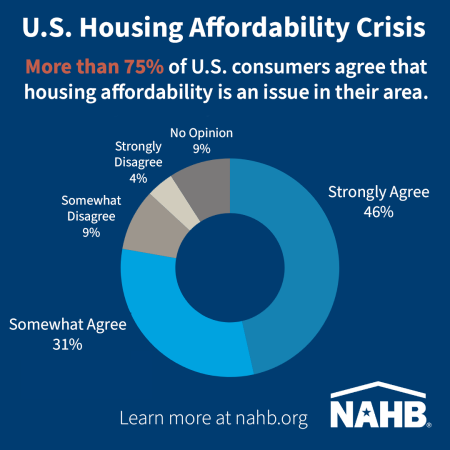According to a survey conducted on behalf of the National Association of Home Builders, nearly four out of five Americans agree that the country is in the midst of a housing affordability crisis and that officials at all levels of government are not doing enough to address this issue.
 NAHB Chairman Carl Harris emphasizes that the survey is a sobering reminder of the public's call for policymakers to act. "Americans are calling on policymakers to ease burdensome regulations, roll back inefficient zoning rules, and provide builders and developers with the proper business climate so that they can construct more homes and apartments to provide our citizens with better homeownership and rental housing opportunities," says Harris.
NAHB Chairman Carl Harris emphasizes that the survey is a sobering reminder of the public's call for policymakers to act. "Americans are calling on policymakers to ease burdensome regulations, roll back inefficient zoning rules, and provide builders and developers with the proper business climate so that they can construct more homes and apartments to provide our citizens with better homeownership and rental housing opportunities," says Harris.
"With a nationwide shortage of 1.5 million housing units, the American people are demanding that their elected officials put in place policies that will enable builders to increase the production of sorely needed housing. This poll should be a wake-up call for officials to act now because they may find it could be too late come November," adds Harris.
Survey says...
The survey revealed that 77% of respondents reported a housing affordability crisis in their communities. Eighty percent said their city and county officials were not doing enough to encourage the production of affordable housing, and 51% felt their elected representatives in Congress were also falling short. Key findings from the survey include:
- 80% believe policymakers should consider housing affordability when creating new laws and regulations.
- 74% support government incentives for builders and developers to create more affordable housing.
- 65% back replacing the mortgage interest deduction with an annual tax credit for mortgage interest.
- 64% support incentivizing local governments to ease zoning regulations.
- 56% stress the importance of creating more medium-density housing for moderate-income households, younger households, and first-time home buyers.
A call to policymakers
Meanwhile, more than 900 business professionals in residential construction convened on Capitol Hill for the NAHB 2024 Legislative Conference, urging Congress to address the chronic headwinds contributing to the housing affordability crisis. Harris led the call for action, stating, "The only way to tame shelter inflation and to ease the housing affordability crisis is to build more homes and apartments."
Housing advocates conducted over 250 individual meetings with their representatives and senators, pushing for action on three key issues in NAHB’s housing plan: adopting reasonable building codes, addressing shortages of distribution transformers and promoting careers in the skilled trades.
Building codes — The plan includes reversing a costly national codes mandate by the U.S. Department of Housing and Urban Development and the U.S. Department of Agriculture, which requires new construction to comply with the 2021 International Energy Conservation Code or ASHRAE 90.1-2019. Studies have shown this mandate could add up to $31,000 to the price of a new home, making it unaffordable for many.
Transformers — The severe shortage of distribution transformers has delayed housing projects nationwide, with wait times for transformers ranging from 12 to 24 months. Congress can help by fixing supply chain disruptions and boosting domestic manufacturing capacity for these essential components.
Workforce development — The labor shortage in the construction industry, with roughly 400,000 workers needed monthly and 2.2 million new workers required over the next three years, is another critical issue. Congress can address this by fully funding Job Corps and making meaningful investments in education to encourage careers in the skilled trades. Sen. Steve Daines (R-Mont.) and Rep. Chuck Edwards (R-N.C.) both emphasized the importance of the construction industry and pledged support for reducing regulatory burdens and extending the 2017 Tax Cuts and Jobs Act to aid small businesses.

